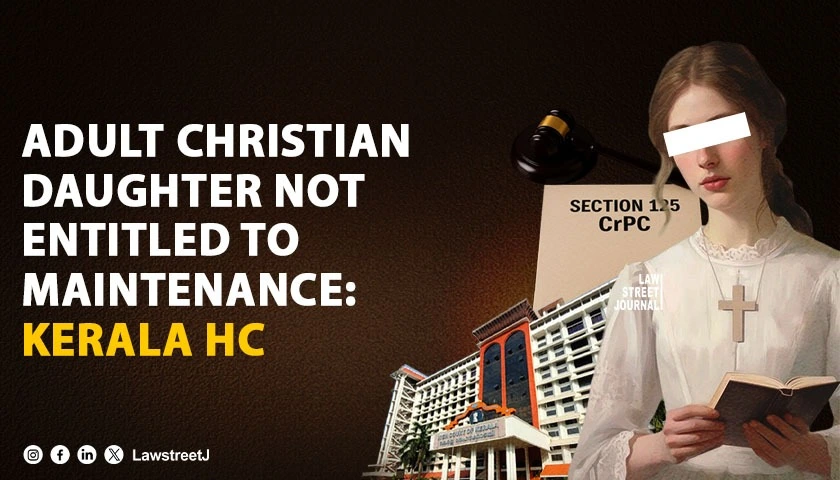Kerala: The Kerala High Court has clarified that under Section 125 of the Code of Criminal Procedure, 1973 — corresponding to Section 144 of the Bharatiya Nagarik Suraksha Sanhita (BNSS) — a major daughter is not entitled to claim maintenance from her father unless she is unable to maintain herself due to any physical or mental abnormality or injury.
The court of Justice Dr. Kauser Edappagath delivered the ruling on October 29, 2025, while partly allowing R.P.(F.C.) No. 157 of 2021 filed by Varghese Kuruvila @ Sunny Kuruvila, challenging the Family Court’s order directing him to pay monthly maintenance to his wife and 27-year-old daughter.
The petitioner, the husband of respondent No.1 and the father of respondent No.2, contended that the Family Court’s order granting ₹20,000 per month to his wife and ₹10,000 to his major daughter was unsustainable. He argued that the daughter, being 27 years old and a practising lawyer, was not entitled to maintenance under the statutory scheme.
Examining the issue, Justice Edappagath observed that Section 125(1)(c) CrPC, corresponding to Section 144(1)(c) BNSS, allows an unmarried daughter to claim maintenance from her father only if she is, by reason of physical or mental abnormality or injury, unable to maintain herself. The Court stated that a claim of maintenance by a daughter who has attained majority is admissible only when, by reason of such abnormality or injury, she is unable to maintain herself.
Finding that the daughter was a practising advocate and that there was no evidence of any such abnormality, the Court held that she was not entitled to maintenance.
Justice Edappagath discussed earlier rulings that recognised the right of Hindu daughters to claim maintenance from their fathers under Section 20(3) of the Hindu Adoptions and Maintenance Act, 1956, which imposes a civil liability on a Hindu father to maintain his unmarried major daughter. The Court clarified that no similar statutory obligation exists under Christian personal law. Referring to the Full Bench ruling in Mathew Varghese v. Rosamma Varghese, the Court reiterated that a Christian father’s duty of maintenance extends only to his minor children.
Accordingly, the Court held that an unmarried Christian daughter who has attained majority is not entitled to claim maintenance from her father in a proceeding under Section 125 CrPC or Section 144 BNSS, unless she is unable to maintain herself due to physical or mental abnormality or injury.
Turning to the wife’s claim, the Court rejected the petitioner’s argument that his wife was disentitled to maintenance as she had been living separately. Justice Edappagath held that her decision to reside in Mumbai was justified, as she was staying there for the education and medical care of her ailing son. The Court observed that when a wife chooses to reside away from her husband to provide better treatment and education for her son, it cannot be said that she is living separately without sufficient reason.
The Court also dismissed the argument that the wife’s part-time employment disqualified her from receiving maintenance. It held that even an earning wife may be entitled to maintenance if her income is insufficient to maintain the standard of living she enjoyed during the marriage.
Considering the husband’s financial capacity, including ownership of two flats worth ₹90 lakhs and average monthly withdrawals of ₹60,000, the Court found the ₹20,000 monthly maintenance awarded to the wife by the Family Court reasonable and affirmed it.
The order granting maintenance to the daughter, however, was set aside.
Case Title: Varghese Kuruvila @ Sunny Kuruvila v. Annie Varghese & Anr.




![Kerala HC Quashes 498A Dowry Harassment Case Against Live-In Partner, Citing Lack of Relative Status [Read Order]](/secure/uploads/2023/08/lj_5693_1057c042-1e57-4e27-8c9e-25af0ec38ec4.jpg)
![Watching porn on mobile: Kerala HC highlights importance of mother cooked meals, outdoor sports [Read Order]](/secure/uploads/2023/09/lj_9155_Parental_supervision_of_mobile_phone_usage.jpg)
![Lakshadweep MP Mohammed Faizal Disqualified from Lok Sabha After Conviction Suspension Plea Rejected by Kerala High Court [Read Notice]](/secure/uploads/2023/10/lj_9640_87b5fd97-0e05-4ff8-9a99-3be1e4446192.jpg)




